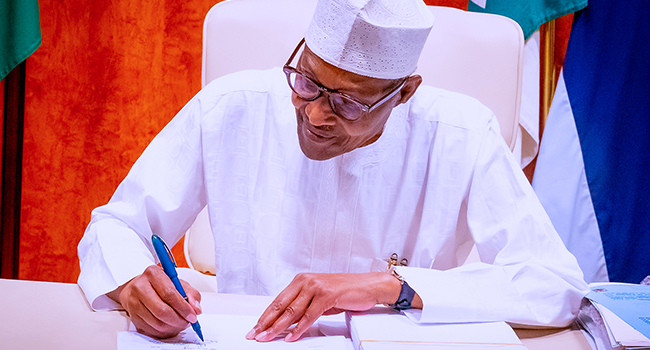President Muhammadu Buhari has moved electricity generation and distribution as well as railway from the exclusive power of the federal government.
States now have power to generate and distribute electricity alongside the federal government.
Also states can now construct rails.
These were contained in the 16 constitutional amendments which he signed on Friday, March 17, 2023.
He signed into law 16 bills seeking to amend various parts of the 1999 Constitution.
The Joint Senate and House of Representatives’ Special Ad Hoc Committee on the Review of the 1999 Constitution made this known on Friday.
The bills assented to by the President included those devolving powers from the Federal Government to the states as some items were moved from the Exclusive Legislative List to the Concurrent List in the Constitution.
The power devolution bills that passed legislative requirements include those on power, railway, airports and prisons as well as biometric and criminal records.
The President also signed the bills seeking to grant state legislature and judiciary autonomy.
The National Assembly in January transmitted 35 Constitution Alteration Bills passed by the state House of Assembly, out of the 44 bills sent to the states.
To amend a clause in the constitution (two-thirds or four-fifth) majority of each of the Senate and the House need to approve the amendment after which it will be transmitted to the state Houses of Assembly, where two-thirds or 24 out of the 36 of them have to concur.
Out of the 36 states, 27 Houses of Assembly – Abia, Adamawa, Akwa Ibom, Anambra, Bauchi, Bayelsa, Benue, Borno, Cross River, Delta, Ebonyi, Edo, Ekiti, Enugu, Imo, Kaduna, Kano, Katsina, Kogi, Lagos, Nasarawa, Niger, Ogun, Ondo, Osun Rivers and Yobe – forwarded their resolutions on the bills.
The House had urged Houses of Assembly in Gombe, Jigawa, Kebbi, Kwara, Oyo, Plateau, Sokoto, Taraba and Zamfara states “that are yet to forward their resolution on the bills to do so in fulfillment of their constitutionally imposed legislative obligation to the constitution amendment process.”
On Friday, however, a statement from the deputy speaker’s office quoted Wase as commending the President for assenting to “some momentous legislations.”
According to Wase, the legislation was fragmented into 16 bills. They are, “Fifth Alteration (1) The bill seeks to alter the Constitution of the Federal Republic of Nigeria, 1999 to change the names of Afikpo North and Afikpo South Local Government Areas; and for related matters.
“(2) to change the name of Kunchi Local Government Area; and for related matters; (3) to change the names of Egbado North and Egbado South Local Government Areas; and for related matters; (4) to correct the name of Atigbo Local Government Area; and for related matters; (5) to correct the name of Obia/Akpor Local Government Area; and for related matters.
“(6) The bill seeks to alter the constitution to provide for the financial independence of state Houses of Assembly and state Judiciary; and for related matters; (8) to regulate the first session and inauguration of members-elect of the National and State Houses of Assembly; and for related matters; (9) to delete the reference to the provisions of the Criminal Code, Penal Code, Criminal Procedure Act, Criminal Procedure Code or Evidence Act; and for related matters.”
One of the bills assented to by the President include the provision that presidents-elect and governors-elect should submit the names of persons nominated as ministers or commissioners within 60 days of taking the oath of office for confirmation by the Senate or state House of Assembly.













